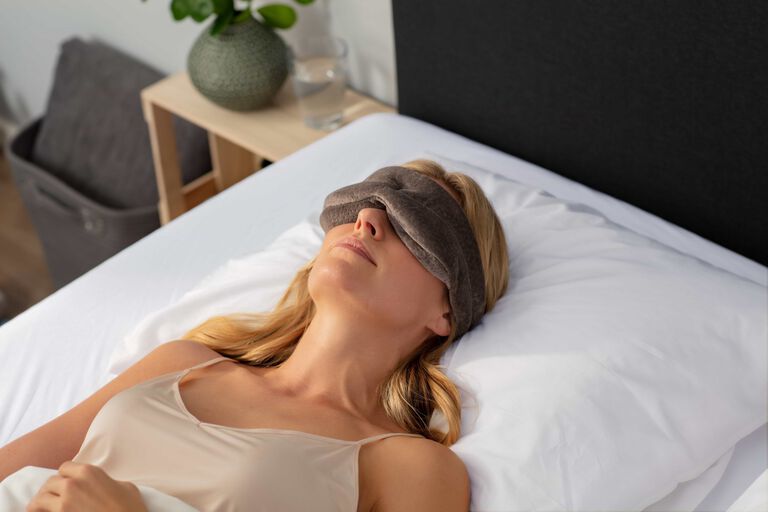SHOULD YOU LET YOUR PET SLEEP WITH YOU?

Pets can be found in most UK households, and as pet owners we love spending time with them. However, is it okay for them to sleep in our beds? In this article, TEMPUR® compares the benefits and disadvantages of sleeping with your pet.
THE BENEFITS OF SLEEPING WITH YOUR PET
Our pets bring joy to our lives, so it’s no surprise that sharing a bed with your pet can make you feel safer at night, both emotionally and physically. In fact, there are many benefits to sharing your bed with your pet, and there has even been research that shows that it may improve your sleep, as long as they aren’t under the covers.
Many people who suffer from insomnia can also experience mental health issues such as stress, depression and anxiety. Often, the emotional instability of these disorders makes it difficult to fall asleep at night and as a result, a furry companion like a dog or a cat sleeping on your bed can massively help with these disorders.
The rhythmic breathing and warmth of a pet’s body while you sleep has a soothing effect that helps some people sleep. As we have a lower body temperature than our pets, they can also act as a natural heater.
THE BEST PETS TO SLEEP WITH
Humans and animals have different sleep patterns, meaning that by sleeping together, we can alter each other’s sleep patterns.
Dogs sleep for 12 to 14 hours per day, depending on their breed, size, age, and health. Lots of dog owners allow their dog to sleep in their bed with them, while others prefer their dog to sleep in a special crate or dog bed.
Cats sleep for 15 hours on average per day but may sleep up to 20 hours depending on their age. It is therefore more common for these sleep lovers to snooze with us in our beds, and the percentage of people who sleep with their cat is higher.
Looking at other popular pets, rabbits sleep between eight to nine hours per day and ferrets sleep for an enormous 18 to 22 hours per day.
THE DISADVANTAGES OF SLEEPING WITH YOUR PET
Despite the aforementioned benefits, letting your cat or dog sleep on your bed might not be for you. For example, even if you don’t consider yourself to be a light sleeper, pets can still disturb your sleep at night as a result of your different sleeping patterns.
Next, you should not let your pet sleep in the same bed with you if you suffer from pet allergies or asthma. In fact, they shouldn’t even be allowed in the bedroom, or you may have trouble sleeping. Even if you’re not allergic to your pet, your pet spends more time outside interacting with things you take care to avoid, which could increase your risk of disease.
Lastly, researchers have found that people who share a bed with their pets take longer to fall asleep. They are also more likely to wake up tired, although this tiredness usually doesn’t last throughout the day. However, as there has only been a small amount of research that has been done on this topic, evidence has shown that the benefits of sleeping with your pet much outweigh the disadvantages.
HOW TO IMPROVE YOUR SLEEP WITH YOUR PET
Sleeping on a memory foam mattress can massively help your sleep. Memory foam’s motion transfer properties will soften any movement your pet makes and give you peak comfort to ensure a great night’s sleep. Memory foam can also help your sleep if you suffer from back pain.
It’s also important to be consistent with your pet from the beginning, namely whether you want them in your bed or not. This will mean that that your pet is clear on what they should or shouldn’t be doing, helping improve their behaviour and your sleep.
Focusing on improving your pet’s behaviour will massively improve your sleep as a result. If your pet wakes you during the night, do not indulge them with a midnight play or snack session. To avoid your pet waking you up to go to the toilet, let them outside last thing, as close to your bedtime as possible.
Sleeping with your pet can be an enjoyable experience if it’s done the right way. However, if you don’t have a pet, why not substitute with soft plush animals?
Download our brochure
Want to know more about our story? Download our brochure to see more.

Visit a TEMPUR® store or talk to a sleep expert
Want to know more about TEMPUR®? Either visit us in store or arrange to speak to us today.
Get the latest news and offers
Sign up to receive news and offers about TEMPUR® products. Detailed information on the use and storage of data can be found in the Privacy Policy.


